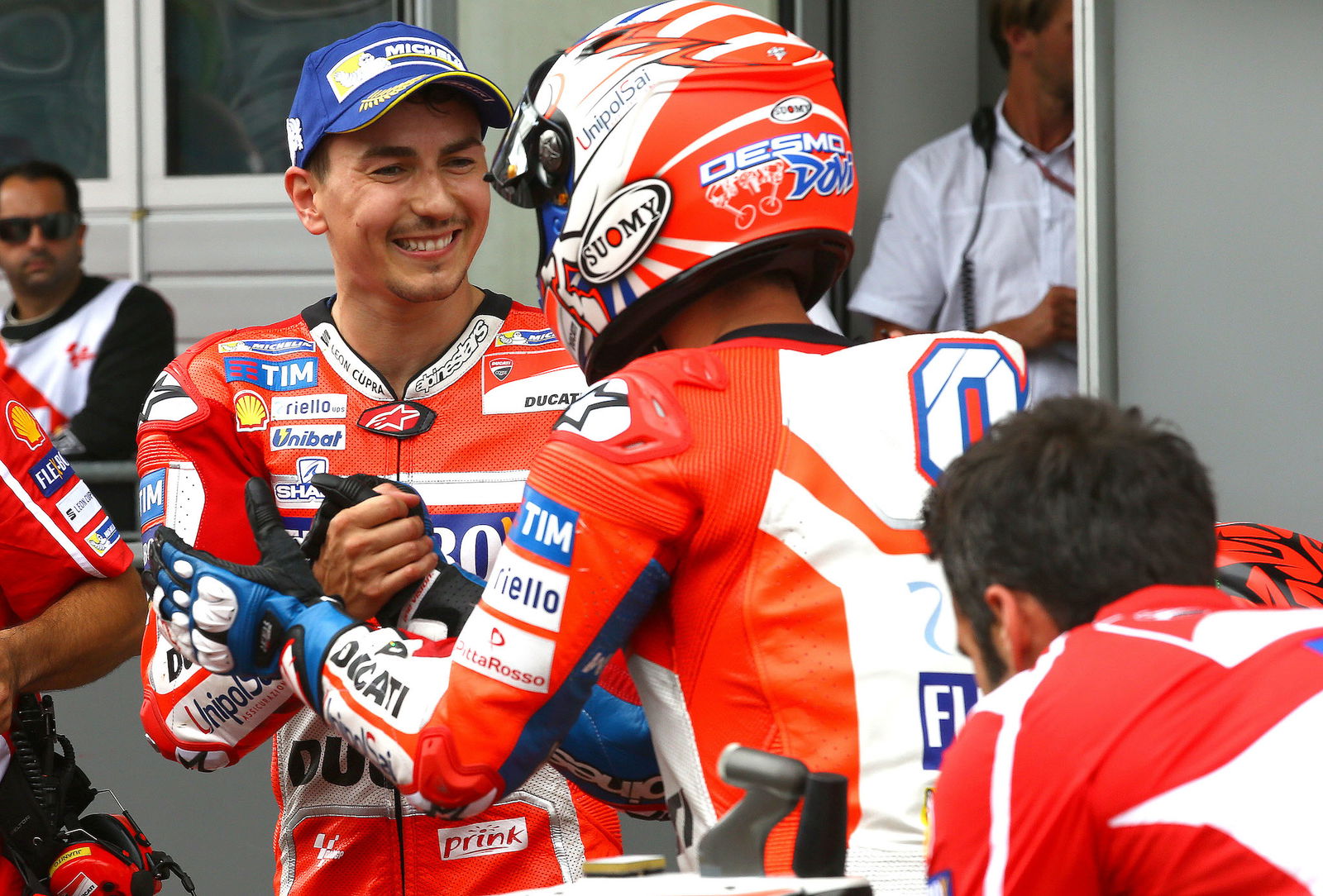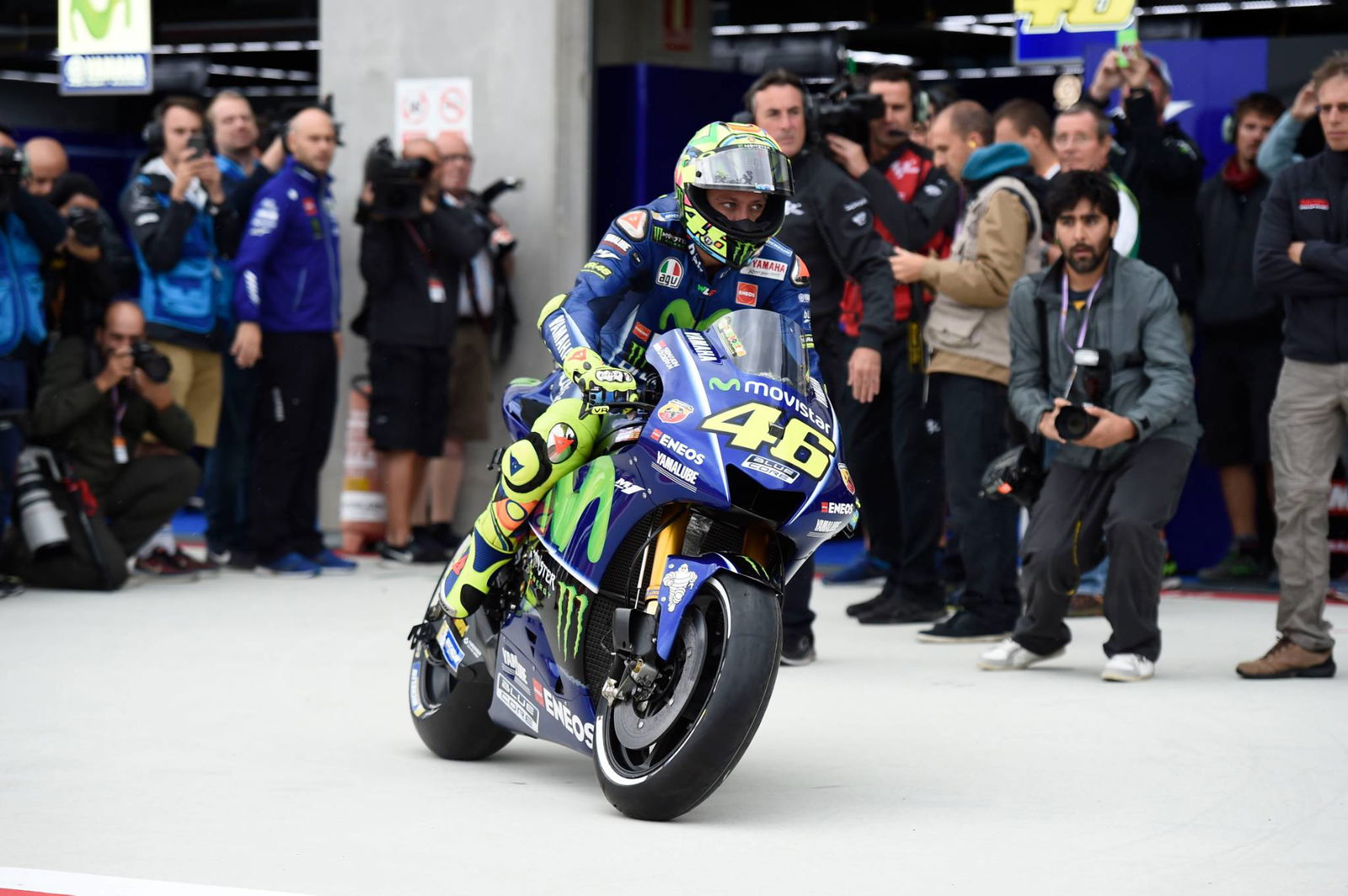MotoGP: ‘A top rider – and a completely normal guy’
‘Normal’ is not an adjective you would associate with a man accustomed to wrestling a 270bhp machine at well over 200mph and whose focus on self-improvement borders on the obsessive.
Yet, off the bike, Andrea Dovizioso appears to be just that: a regular guy operating at the top of his profession who resists many of the trappings that come with his position of prominence.

‘Normal’ is not an adjective you would associate with a man accustomed to wrestling a 270bhp machine at well over 200mph and whose focus on self-improvement borders on the obsessive.
Yet, off the bike, Andrea Dovizioso appears to be just that: a regular guy operating at the top of his profession who resists many of the trappings that come with his position of prominence.
Following his inspired – but ultimately doomed – title bid last November, the 31-year old stated: “In the world, everybody try to be the best and the nicest, and the man that takes the most money, and takes the better car … I mean this is the style almost everybody tries to follow.
“I don’t follow that way so to be able to fight with the best riders in the world in a completely normal way – I live in a normal way even if I’m lucky to have money and to race in MotoGP - I have a different objective, goal in my life.”
It’s a view shared by Tech 3 team boss Hervé Poncharal, who worked with Dovizioso in 2012, the Italian’s sole season competing aboard satellite Yamaha machinery.
Although short, their relationship was a fruitful one, as Dovizioso surpassed expectations to claim six podium finishes and fourth in the final championship standings – three places ahead of team-mate Cal Crutchlow, and six clear of factory Yamaha man Ben Spies.
Poncharal insists Dovizioso was certainly among the best riders – if not the best – to ride for the Tech 3 outfit that has been operating in the premier class since 2001. But for the Frenchman, it was the former 125cc world champion’s working methods that left the greatest impression.
There was no great ego that usually follows riders who once commanded a place in the paddock’s biggest factory team. Poncharal was unable to recall an occasion when Dovizioso voiced extreme displeasure at the lack of resources at his disposal, when compared to those he enjoyed in the Repsol Honda team from ’09 to ‘11.
The Frenchman also remembers an invite to Dovizioso’s residence near Misano, where he saw “a nice house – but nothing flashy”, “a normal car” and a barbeque operated entirely by his rider. “Not many riders do this,” Poncharal noted.
“First I want to say that it was an incredibly good year,” recalls Poncharal, referencing 2012. “We always say this was maybe the best rider we ever worked with. He had been downgraded from a factory to a satellite operation and he never behaved like he had been downgraded.
“He was used to things that he didn’t have with us and he never once complained. And he could have. In terms of salary, organisation, logistics. He did incredible. He did a lot of podiums with us and was quite often challenging the factory guys without exactly the same equipment.
“I remember that he’s been many times requesting the possibility to have better support, to have factory equipment, to have the possibility to stay with us with full factory equipment. But that was already denied.
“A lot of people in the paddock were seeing him as a ‘B’ rider. I don’t want to sound pretentious by saying, ‘We knew’. But honestly, what he did with us, the way he was working, the feedback and the comments we were getting from him were incredibly precise and impressive.
“What our riders are saying is not very often used. They [Yamaha] are focussing on the factory riders. I felt sorry sometimes because clearly either you are in the factory team or you are not.
“He was smart. It could have been the end of his career because he went from a factory Repsol Honda to a satellite team. But the way he worked with us, I was sure he was going to have some other opportunities. He’s so committed.
“I’ll always remember before the San Marino Grand Prix he invited us to his house. The way he lived was unbelievable. He’s a completely normal guy. He has a house which is a nice house - but it’s nothing flashy, like a superstar. He has a normal car. He lived with his mum and his daughter.
“He showed us the small workshop that he has because he loves motocross. He works himself on his motocross bike. He did the barbeque himself. He was shopping, brought everything back for all of us. Not many riders do this. We really appreciated him. He’s a super nice man and a top rider.”
Through 2012 Dovizioso had his eyes firmly set on the second seat in the factory Yamaha squad. Spies was experiencing his annus horribilis and there appeared to be a vacancy alongside Jorge Lorenzo for the following year.
Yet Dovizioso’s hopes of landing his dream job were thwarted by Valentino Rossi’s return to the fold after two dismal years at Ducati. Eventually the Bologna marque came calling the other, less decorated Italian. Poncharal knew the offer of being installed as a factory figurehead would prove too great a pull for his man to resist.
“I think he enjoyed this year a lot. He loved the Yamaha. At that stage his dream was to have full factory support from Yamaha. He would have stayed [if he got that],” Poncharal says. “We talked a lot.
“He was always telling me – and it was not a pretentious attitude from him – ‘I fear nobody. I can do the job. But I would really like to have an opportunity to be in a factory team with a factory that follows me.’
“When he was HRC he was rider number three. He loves the technical [side of things] and he loves development – maybe at that time more than riding. Now I think he maybe enjoys riding more than [the] technical [side].
“At that time he wanted to be involved. You cannot be involved in the technical in a satellite operation, giving the direction of where you want to go.”
“I think maybe Dovi went to the best place he could have been because Ducati was a bit lost at that moment when joined them. Cal gave up. It was not easy. Showing them what he showed them gave the factory [a boost] and the factory gave him everything he wanted. Somewhere else would have been impossible, because he would have been rider number two. You know how it is.”
So what did Poncharal make of Dovizioso’s success in 2017, a year in which he won six races and took the championship fight all the way to the final third of the final race of the year? “I’m very pleased for him,” he says.
“I think he deserves it. He shows that somebody who is working hard with not necessarily an incredible ego can be there. What he did winning six races, especially [Japan], where almost nobody can do what Marquez does in those conditions, and fighting and beating him in the end, it’s something special.
“Always when a man is happy, he is giving more. And when he feels that he is supported and trusted he is giving more. This is the first time Dovi is in a position where Dovi feels he is trusted. Finally he sees the fruit of his work and finally this has given him an extra boost. Maybe before he was riding at 90 but he’s riding at 100 now.
“Also because deep inside himself, having heard all the things [like] ‘You will never be a Lorenzo, Rossi or Marquez’ – even if you don’t think that but you read this again and again – maybe you start to see yourself as a ‘B’ rider.
“But now, a world champion – Lorenzo – has arrived and he is beating him, for sure this has helped him to wake up and say, ‘I can do it! And this is the year.’ Sometimes it’s a fine line. I’m happy for him.”

